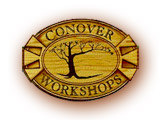

|
Quantity |
Size/Grade |
Tool
or Item |
Comments |
|
Turning
Tools: |
|
|
|
|
1 |
3/8" |
Bedan
or Beading and Parting Tool |
Essential
tool for making tenons. |
|
1 |
1/16"
to 1/8" |
Parting
Tool (sometimes called a Cutoff Tool) |
A
diamond shape is better tan rectangular. |
|
1 |
3/4"
to 1-1/4" |
Roughing
Out Gouge |
The
wider the better! |
|
1 |
1"
or wider |
Skew
Chisel |
You
have three choices, standard, rolled edge and oval. Oval is the easiest
to use mad probably the best choice for beginners. |
|
1 |
1/2" |
*Spindle
Gouge |
Preferably one ground from round bar stock. Not one stamped or forged from a 1/8" thick strap of steel. We will teach you how to put a correct fingernail grind on it. |
|
Other
Tools: |
|
|
|
|
1 |
10
to 18 point |
Backsaw
|
Crosscut
or rip filing is o.k. Avoid very thin backsaws, especially Japanese for
they do not work well for half-blind dovetails. |
|
1 |
|
Cabinet
Scraper |
|
|
1 |
|
Carvers
Mallet |
Round
wooden type is best, the rubber headed types are too "bouncy. Avoid
hammer type mallets. |
|
|
12" |
Combination
Square |
The
Starrett Combination square is a good investment. |
|
1 |
|
Hammer |
Standard
claw or Japanese are fine. |
|
1 |
|
Marking/Mortising
Gauge |
Traditionally
marking and mortising gauges were separate tools but now days they are
combined into one tool for economy. If you have separate marking and
mortising, that is fine. |
|
1 |
5/8" |
Open
End Wrench |
For
sizing tenons on the stretchers. |
|
1 |
11/16" |
Open
End Wrench |
For
sizing tenons on the arm posts. |
|
2 |
8"
to 10" |
Screw
Clamps |
Size
refers to length of jaw |
|
1 |
Straight |
Screw
driver |
|
|
1 |
Phillips |
Screw
driver |
|
|
1 |
1/4"
to 3/4" |
Set
of Bevel Edge Chisels (Also known as Carpenter's chisels) |
Buy
an 8 piece set rather than a 5 piece set if you can afford it. It is
most useful to have a 1/8" chisel for dovetails. Be sure to buy
"bench" chisels and not the shorter "butt" chisel
which is commonly all that is available at hardware stores. Japanese
chisels (Oire-Nomi) are excellent but expensive. |
|
2 |
|
Strap
Clamp |
Good
for dry assembly and final glue up. Cargo straps with a ratchet type
tightening mechanism work just as well. |
|
Other
Items: |
|
|
|
|
1 |
4"
to 6" |
Calipers |
Good
for checking diameters, but don't rush and buy. |
|
1 |
4"
to 6" |
Dividers |
Good
for stepping off distances, but a ruler and a pencil will do the job
fine. |
|
1 |
|
Tongue
and Groove Pliers |
Often
called Channel Locks these are a must for driving tacks during seat
weaving |
|
1 |
|
Sissors |
For
cutting tape during seat weaving. |
|
1 |
|
Dust
Mask |
Very
nice when sanding. Automotive paper masks are adequate but respirator is
better. |
|
1 |
|
Ear
Protection |
Ear
muffs are easiest to use but plugs are fine. (Absolutely
must have) |
|
1 |
|
Face
Shield |
Optional,
see safety glasses |
|
1 |
|
Notebook |
|
|
1 |
|
Pencil |
|
|
1 |
Folding
or Tape |
Ruler |
|
|
1 |
|
Safety
Glasses |
You
must have a minimum of safety glasses, Most prescription glasses are
safety lenses, but need side shields to be true safety. If in doubt
bring face shield to go over glasses. |
|
2 |
60g
to 80g |
Sandpaper |
We
favor Klingspore PS 33 in a B weight which is a stearated, open coat,
aluminum oxide paper. |
|
2 |
120g
to 180g |
Sandpaper |
We
favor Klingspore PS 33 in a B weight which is a stearated, open coat,
aluminum oxide paper. |
|
2 |
220g |
Sandpaper |
We
favor Klingspore PS 33 in a B weight which is a stearated, open coat,
aluminum oxide paper. |
|
Nice
to Have Tools, But Not Necessary: |
|
||
|
1 |
|
Fishtail
Gouge |
|
|
1 |
|
Orbital
Sander and an Assortment of Abrasives |
|
|
1 |
36" |
Straight
Edge |
A
strip of wood from the scrap bin will work. |